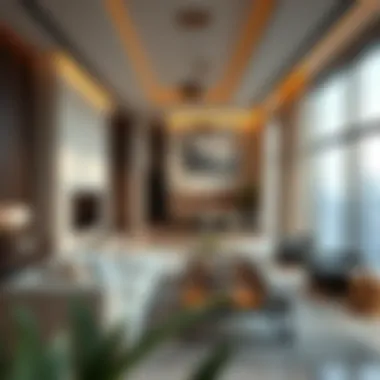Dubai Real Estate Market 2023: Key Trends and Opportunities


Intro
Dubai remains a superb stage for the real estate market in 2023, capturing the attention of investors, buyers, and analysts alike. The city's skyline has transformed into a kaleidoscope of architectural beauty, reflecting its ambition to be a major global hub. Yet, beyond the glamour of luxurious skyscrapers and sprawling developments lies a terrain shaped by evolving economic factors, buyer behaviors, and regulatory adjustments.
As we embark on this exploration of the Dubai real estate market for the year ahead, it becomes vital to note the diverse dynamics at play. Understanding these elements can not only illuminate the current landscape but also reveal the opportunities and potential pitfalls. From shifting preferences of homebuyers for specific neighborhoods to the impact of economic trends, this article endeavors to provide a thorough dissection of what drives the market today.
What should one expect? Prices are on the move, and certain areas are emerging as hotspots, while others struggle to find footing. Investors must navigate the complex web of laws and regulations that govern property ownership and investment in the UAE. This article aims to equip you with insights and data, breaking down key trends, potential risks, and rewarding investment avenues that define the pulse of this vibrant market.
Expect to delve into details of current property prices, the most promising neighborhoods, as well as high-return investment opportunities awaiting eager buyers. Let’s get started on this journey through the ever-busy streets of Dubai’s real estate world.
Overview of the Dubai Real Estate Market
The Dubai real estate market stands as a dynamic and essential sector within the economic landscape of the emirate. In 2023, it embodies a myriad of opportunities, diverse investment options, and a continuously evolving environment shaped by economic forces and changing demographics. Understanding this market's intricacies is crucial for prospective buyers, seasoned investors, and anyone curious about the shifts occurring in one of the world's most vibrant cities.
The importance of this overview lies not just in the statistics but in the stories behind them. As the old saying goes, "There's more than meets the eye." This rings especially true in real estate, where trends and indicators often reflect underlying economic and social currents. Analyzing the state of the market in terms of performance indicators—like sales volume, price trends, and rental yields—provides a clearer image of where things stand and where potential opportunities might lie.
Market Performance Indicators
Understanding performance indicators can illuminate the potential pathways for growth and investment in Dubai. These indicators are not merely numbers; they are signals that highlight the health and direction of the real estate landscape.
Sales Volume
Sales volume serves as a cornerstone of the real estate market, pointing to the total number of property transactions within a specific period. For Dubai in 2023, the sales volume reflects robust activity, indicating a strong demand from both locals and foreigners. This aspect is beneficial for the overall narrative as it demonstrates buyer confidence in the market and underlines the emirate's reputation as a lucrative investment destination.
A unique feature of the sales volume is its ability to showcase market volatility. While a high sales volume typically suggests favorable conditions, sudden spikes could signal speculative buying or market corrections. Investors and agents alike should remain vigilant, interpreting these fluctuations carefully to align their strategies with market realities.
Price Trends
Price trends encompass the changes in property values over time, which can signal market health and investment viability. In 2023, Dubai is experiencing various price trends driven by factors such as location, property type, and overall economic sentiment. Notably, high-value areas such as Dubai Marina and Palm Jumeirah continue to see upward price pressure, making them attractive for high-net-worth individuals.
However, it’s worth mentioning that price trends also come with their own set of potential disadvantages. Abrupt price increases can create affordability issues, potentially stunting broader market growth if wage growth does not keep pace with escalating housing costs. Thus, tracking these trends closely enables investors to make informed decisions and avoid jumping on a bandwagon at the wrong time.
Rental Yields
Rental yields indicate the return on investment from rental properties, often expressed as a percentage of the property's value. In terms of 2023, Dubai is showcasing rental yields that are relatively attractive compared to other global markets. For instance, prime areas still yield returns that can sway investor interest, especially among those looking for long-term gains.
What makes rental yield a particularly appealing aspect of the real estate equation is its stability. While property prices may rise and fall due to various influences, rental income can provide a steady cash flow that mitigates risk. However, investors must be cautious, as high rental yields could also be a result of rising supply that outstrips demand, indicating potential market shifts.
As the real estate market in Dubai continues unfolding, observing these indicators will offer significant insights to navigate this complex terrain. Real estate agents and property developers, along with potential investors, should engage deeply with these trends to identify where to plant their stakes in this rapidly growing market.
Economic Factors Influencing Real Estate
Understanding the economic forces that shape the Dubai real estate market in 2023 is essential for buyers, sellers, and investors alike. Economic factors not only drive the demand for properties but also influence investment opportunities, pricing strategies, and future market potential. As the real estate sector is often a significant reflection of the broader economy, keeping an eye on these indicators is paramount for informed decision-making.
Impact of Economic Growth
GDP Growth Rate
The GDP growth rate stands as a solid beacon of economic health. In Dubai, a robust GDP growth can signal an increasing demand for real estate, as business expansions and population growth spur housing and commercial investments. The past few years have seen fluctuations, but the rebound after the global slowdown shows resilience.
A key characteristic of the GDP growth rate in Dubai is its connection to diversification strategies pursued by the government. This means that sectors like tourism and technology are growing, leading to more people needing homes and spaces to work. This overall economic vigor is a beneficial choice for anyone involved in the real estate market, as a bustling economy typically means higher property valuations.
However, it's also crucial to consider that rapid growth can lead to overheating in the market. Inflation pressure could arise, potentially pushing property prices beyond what the average buyer can afford, leading to future corrections. So, while a high GDP growth rate sounds appealing, it comes with its share of challenges that need close observation.
Inflation Trends
Inflation trends play a significant role in the dynamics of the real estate market. In a city like Dubai, where luxury properties often command high prices, any rise in inflation means increased costs for both developers and buyers. Higher prices of raw materials, labor, and services all contribute to overall inflation, affecting everything from housing prices to rental rates.
The unique feature of inflation trends in Dubai is the government's proactive stance on managing price stability. This is vital since fluctuations can deter investors or potential homeowners who fear uncertainty in their investment. One advantage is that as inflation rises, so do rental yields, providing landlords with more revenue potential. On the flip side, buyers might find it challenging to enter the market if property prices spike faster than wages.
Foreign Investment Trends
Major Investment Sources
Foreign investment remains a cornerstone of Dubai's real estate ecosystem. The influx of capital from markets like the United States, Europe, and Southeast Asia significantly contributes to demand and pricing. Investors are often drawn to Dubai for its tax advantages and the cosmopolitan lifestyle it promises.
A notable characteristic of major investment sources is the growing volume of direct foreign investments, especially from wealthy individuals looking for safe havens for their money. Such investments can be a promising indication of the market's attractiveness. However, reliance on foreign capital can pose risks; any geopolitical tensions or changes in global investment sentiment can swiftly affect market stability.
Investment Regulations
Investment regulations in Dubai provide a double-edged sword. On one hand, they establish a clear framework for foreign investors and protect against arbitrary ownership changes. On the other hand, navigating these regulations can be daunting, especially for newcomers not familiar with the local laws.


The positive aspect of regulatory frameworks is their focus on transparency and security, crucial for building investor confidence. However, it's worth noting that excessive regulations can slow down investment growth, especially if they involve hefty fees or complex compliance processes. Investors need to stay informed about legislative changes, as they can drastically reshape the real estate landscape.
Keeping an eye on economic indicators is vital for anyone involved in the Dubai real estate arena. Ignoring them could lead to missteps that cost dearly.
In summary, the intersection of economic growth, inflation, and foreign investment trends shapes the dynamics of the Dubai real estate market. Whether you're a buyer determining the right time to invest, or an investor scrambling to keep up with the next big trend, being well-informed is the key to thriving in this competitive environment.
Customer Demographics and Preferences
Understanding the customer demographics and preferences in the Dubai real estate market is crucial for investors and developers alike. The market in Dubai is not a monolithic entity; rather, it is an intricate tapestry woven with various threads of buyer profiles, age groups, and shifting priorities. Having a clear comprehension of these elements can steer strategic decisions and shape marketing efforts effectively.
Profile of Buyers in
Local vs. International Buyers
When considering who forms the backbone of the buyer landscape, the divergence between local and international buyers stands out significantly. Local buyers tend to be more familiar with the nuances of Dubai's real estate scene, making them confident and often quicker in their purchasing decisions. This understanding contributes to a healthy turnover rate in local property transactions. On the flip side, international buyers flock to Dubai for its cosmopolitan lifestyle, luxury amenities, and investment potential. They are largely driven by the UAE's tax advantages and the allure of a stable real estate market.
The salient characteristic of local buyers is their focus on resale value and community integration. They often seek properties that are not just investments but also potential homes, encompassing family-friendly neighborhoods with access to schools and healthcare.
In comparison, international buyers typically look at high-profile neighborhoods, often driven by prestige and lifestyle choices. Their decisions hinge on the potential for capital appreciation and rental returns. The competitive edge of this international market is that buyers often consider holding properties for rental income, particularly in areas like Dubai Marina and Downtown Dubai.
Age Demographics
Another critical aspect in assessing customer demographics is the age breakdown of buyers. The millennial and Gen Z populations are increasingly entering the property market, with varied preferences compared to older generations. Younger buyers often prioritize modern aesthetics, energy efficiency, and proximity to workspaces.
What makes age demographics a fascinating angle is the generational shift in how residential needs are perceived. Younger buyers have a foot in both worlds, often looking for properties that offer tech-savvy features and sustainable living options. They're also more inclined to invest in shared living spaces, which is a developing trend.
Older generations, particularly Gen X and Baby Boomers, typically focus on the durability of investments and community reliability. They often seek established neighborhoods that promise a slower, more predictable growth trajectory, primarily for retirement purposes.
Changing Preferences in Property Types
Luxury vs. Affordable Housing
In the Dubai real estate market, the tension between luxury and affordable housing has increasingly defined buyer decisions. Luxury homes hold cachet, associated with exclusivity and high returns. Properties in areas such as Palm Jumeirah symbolize status and a lifestyle that many aspire to attain. However, it's vital to recognize that affordable housing is gaining traction as more locals find themselves priced out of the high-end segments.
The beauty of affordable housing is its widespread appeal; these properties engage a diverse buyer pool looking for practical living solutions without breaking the bank. Investors focusing on this segment can tap into a steady demand for functional living spaces while contributing to community enhancement. Nevertheless, the trade-off lies in lower profit margins compared to luxury counterparts.
Demand for Green Spaces
The increasing demand for green spaces aspect of property types is becoming a yardstick in buyer preferences. In today’s world, many individuals are increasingly conscientious about their living environments and the effects on personal well-being. Buyers are not just looking at property specifications; they increasingly factor in the presence of parks, gardens, and sustainable landscaping.
This shift is not merely anecdotal. Developers are increasingly aligning their projects to include access to green spaces and natural light, which can enhance property value and quality of life for residents. However, integrating these elements into new developments can increase costs, presenting a potential challenge for developers who must find the right balance between aesthetics, function, and budget.
Emerging Areas and Development Projects
The Dubai real estate market is not just about the established iconic locations. The story is evolving toward emerging areas and new development projects popping up across the city. This section delves into regions that are gaining momentum, underscoring opportunities that lie within them. Areas like Dubai Marina, Business Bay, and Palm Jumeirah are well established, but other regions are also heating up for potential investment. With the influx of infrastructure advancements and unique residential offerings, these neighborhoods are making headlines for investors looking for the next big hit.
Hot Spots for Investment
Dubai Marina
Dubai Marina stands out for its breathtaking waterfront living, boasting luxury apartments and stunning views. This area attracts both buyers and renters, helping solidify its place in the market. The vibrant nightlife and recreational opportunities make it especially popular among young professionals and expatriates.
One of the key characteristics of Dubai Marina is the combination of opulence and lifestyle amenities. With easy access to public transport, it's an strategic location for daily commuters. However, its popularity also leads to higher price points, which may not suit every investor’s budget. Still, the consistent demand here often leads to good capital appreciation, making it a worthwhile consideration.
"Investing in Dubai Marina often feels like taking a golden ticket; its striking skyline and high-energy vibe are truly appealing to many needing a touch of luxury in their lives."
Business Bay
Business Bay emerges as another hot spot—catering largely to the commercial sector, it's transforming into a vibrant community of mixed-use properties. This area is often seen as the hub for businesses, with an array of sleek structures hosting offices, hotels, and residences. Its proximity to Downtown Dubai elevates its appeal, allowing residents access to major attractions, including Burj Khalifa and the Dubai Mall.
The unique feature of Business Bay is its ongoing developments. The government’s commitment to infrastructure means more projects are underway, which can only enhance the overall value of surrounding properties. While prices have seen a rise, the upside potential remains significant, particularly as business activities ramp up post-COVID.
Palm Jumeirah
Palm Jumeirah is perhaps one of Dubai's most recognized icons. Famous for its palm-tree shape, this island is not just a feast for the eyes but also houses some of the most luxurious real estate in the world. The area is a popular choice among high-net-worth individuals, drawn by exclusive villas and upscale hotel brands.
A distinguishing feature of Palm Jumeirah is its upscale lifestyle offerings, from private beaches to high-end dining options. However, the higher price tag can deter some investors. Yet for those looking to add prestige to their portfolio, properties here can yield high returns in the luxury rental market.
Significant Upcoming Developments
New Infrastructure Projects
The importance of new infrastructure in Dubai cannot be overstated. Current projects not only enhance connectivity but also drive property values in areas that might have previously been overlooked. Roads, public transport expansions, and social amenities are critical in shaping the way residents and travelers interact with the city.


For instance, the Dubai Metro expansion is set to significantly reduce travel times, making outlying areas much more accessible. These developments are a beneficial choice for investors looking at appreciation potential. That said, investors should consider the construction timelines and potential disruptions during the building phases.
Mixed-Use Developments
In the quest for balanced living and working conditions, mixed-use developments are on the rise. These projects combine residential, commercial, and leisure spaces into single units, appealing to modern consumers who favor walkability and convenience. This trend is reshaping urban life in Dubai, integrating spaces that allow residents to live, work, and play without extensive commuting.
The key characteristic here is the flexibility and community focus these projects bring. While the initial costs might be higher due to land values, the long-term returns often justify the investment, particularly given the shift toward integrated living.
Regulatory Landscape
The regulatory landscape plays a crucial role in shaping the Dubai real estate market. This area encompasses the laws and policies that govern real estate transactions, ownership rights, and investor protections. A sound regulatory framework not only inspires confidence among potential buyers and investors but also promotes market stability. By understanding the rules and regulations, stakeholders can navigate the market more effectively while mitigating risks.
Government Initiatives
New Laws Affecting Ownership
New laws affecting ownership have emerged as significant developments in Dubai’s real estate scene. One key aspect of these laws is the introduction of regulations allowing foreign buyers to fully own properties in designated freehold areas. This characteristic enhances Dubai's attractiveness to international investors, as it opens doors to those who want to have complete control over their property.
Among its unique features, the new ownership laws offer a level of security that was not always available. Buyers can now have confidence that their investments are protected under the law, which is a distinct advantage. This change in policies increases the market's appeal, encouraging both local and international buyers to invest heavily. Some argue, however, that the complexity of navigating these new laws could pose challenges for first-time investors unfamiliar with the local system.
Visa Regulations for Investors
Visa regulations for investors provide another vital element of the regulatory framework in Dubai’s real estate market. The introduction of long-term resident visas for property investors has made it far more attractive for international buyers. These visas allow investors to stay in Dubai for extended periods, fostering a more inviting environment for those considering long-term investments.
A key characteristic of these visa regulations is the potential to gain residency through property investment above a certain threshold. This feature makes it particularly appealing for individuals seeking not only a home but also a lifestyle change. However, some may feel that the specificities surrounding the visa application can be daunting and might discourage less-experienced investors.
Real Estate Transparency
Data Availability
Data availability represents a cornerstone of transparency in Dubai's real estate market. Access to reliable and up-to-date market data is imperative for informed decision-making. Online platforms provide buyers and investors with comprehensive information about property trends, pricing, and market performance, making it easier to make sound financial choices.
One beneficial aspect of enhanced data availability is the ability to analyze real-time market indicators. This characteristic helps potential buyers spot opportunities that might otherwise go unnoticed. Yet, the abundance of information can be overwhelming for some, potentially leading to analysis paralysis, whereby too much data creates confusion instead of clarity.
Regulatory Bodies
Regulatory bodies in Dubai ensure that the real estate market functions effectively and ethically. The Real Estate Regulatory Agency (RERA) is a prominent example, overseeing compliance with laws and protecting the rights of both buyers and sellers. Their role is crucial in fostering trust and transparency in the market, which is essential for maintaining confidence among investors.
The strength of regulatory bodies lies in their ability to enforce standards and mediate disputes. This function is a clear advantage for all market participants, as it creates a more robust environment for transactions. Nevertheless, ongoing regulatory adaptations could lead to uncertainty, especially if parties are not kept well-informed about changes affecting their investments.
"An informed investor makes for a thriving market, and in Dubai, regulation and transparency guide the way."
For more detailed information, resources such as Dubai Land Department and RERA provide valuable insights into the current regulations influencing the market.
Impact of Global Trends
In the context of the Dubai real estate market, global trends play a pivotal role in shaping dynamics and influencing decision-making for various stakeholders. As the market navigates through different phases, understanding these trends becomes not just useful but essential. The integration of global perspectives enables investors and analysts to make informed decisions while anticipating shifts in buyer preferences and market demands.
Post-COVID Market Recovery
Market Resilience
Market resilience refers to the ability of the real estate sector to bounce back from unexpected disruptions. In Dubai, this characteristic has proven to be vital. Following the pandemic, the city’s market exhibited a remarkable recovery, characterized by a resurgence in buyer confidence. This shows a robust economic foundation despite the challenges faced.
The unique feature of market resilience in Dubai lies in its diverse economy and the government’s proactive measures to stabilize investments. One of the key aspects that contribute to this resilience is a combination of effective regulatory support and infrastructure investments. The market's recovery indicates not only a return to pre-pandemic levels but also an opportunity for growth, turning heads of those looking to invest or buy.
Increased Remote Work Trends
The increase in remote work has reshaped how and where people choose to live. In Dubai, this shift has led to a noticeable demand for residential spaces that cater to remote workers. This trend reflects a key characteristic of flexibility and adaptability in living arrangements. Many buyers now prioritize home offices, spacious layouts, and access to amenities, as remote working becomes a norm rather than an exception.
A unique facet of this trend is the notion of "work-life integration"; where individuals seek properties that facilitate both productivity and relaxation. However, while the demand for larger homes with designated workspaces has increased, it also raises the challenge of ensuring sufficient connectivity and infrastructure to support remote work endeavors.
Sustainability and Real Estate
Sustainability is transforming into more than just a buzzword in the real estate landscape; it’s becoming a fundamental expectation among buyers and investors alike. In Dubai, as the global focus on environmental responsibility strengthens, so does the push for sustainable practices within local developments.
Green Building Initiatives
Green building initiatives focus on creating properties that are resource-efficient in their operation. This approach significantly enhances the appeal for buyers interested in investing in sustainable developments. A standout feature of these initiatives is their holistic consideration of energy, water, and material use, which can lead to lower operating costs in the long run.
The benefits of such initiatives extend beyond individual properties; they contribute to a broader movement towards eco-friendly living, aligning with Dubai’s vision to become a leader in sustainability. On the flip side, developers may face challenges in balancing costs while incorporating innovative technologies that meet green standards.
Buyer Preferences Towards Sustainability
Consumer preferences are increasingly swaying towards sustainable properties. Buyers are not just looking for beautiful views or luxury; they are also focused on the environmental impact of their investment. A noteworthy characteristic of this trend is that it encourages transparency among developers about the material and practices used in building.
This buyer shift towards sustainability enriches the market landscape but brings about a challenge for traditional developers who might lag in adopting green practices. Consequently, properties that showcase commitment to sustainable development increasingly attract attention and investment, highlighting the importance of ongoing adaptation in this sector.
"The shift in buyer preferences towards sustainability signals a demand for homes that not only satisfy immediate needs but also ensure a healthier, more sustainable future for generations to come."


Investment Strategies
Understanding investment strategies is crucial in the context of the Dubai real estate market for 2023. As investors look for opportunities in a landscape that is ever-evolving, it’s essential to navigate the market with a clear strategy. These strategies may vary greatly depending on the investor’s goals, risk tolerance, and market conditions. The following sections delve into specific approaches that can enhance investment decisions and lead to successful outcomes.
Identifying Growth Opportunities
Long-term vs. Short-term Investments
When considering real estate investments, the choice between long-term and short-term approaches can dictate the overall success of an investment strategy. Long-term investments typically involve purchasing properties with the intent to hold onto them for several years, gaining from appreciation in value and rental income along the way. This strategy aligns well with those looking for security and passive income, especially in a bustling market like Dubai’s, where growth potential is significant. However, it requires patience, as returns can take time to materialize.
On the flip side, short-term investments often revolve around flipping properties or leveraging quick market changes. This can be a more profitable route in a rapidly changing market but comes with its own set of risks. An investor needs a keen eye on market fluctuations and the ability to act swiftly. Thus, short-term investments can yield high returns but can be nerve-wracking if the market takes an unexpected turn.
Key Characteristics:
- Long-term: Stability and gradual appreciation.
- Short-term: Quick turnover and potential for rapid profit.
Each strategy has its unique features and deserves careful consideration against an investor's individual objectives.
Rental vs. Capital Gains
Another important aspect of investment strategy is the balance between pursuing rental income and capital gains.
Investors focusing on rental income aim to purchase properties that can be quickly rented out to generate a steady cash flow. This is particularly appealing in Dubai, where the demand for rental properties remains robust due to the influx of expatriates and the tourism industry. By securing rental income, an investor can offset the costs of ownership and create a reliable income stream.
In contrast, those aiming for capital gains are more focused on property price appreciation over time. This strategy can be profitable in high-growth areas of Dubai, where values have historically risen. However, it can also be contingent on market trends, making it a more speculative approach.
Key Characteristics:
- Rental: Immediate cash flow; helps with mortgage payments.
- Capital Gains: Profits from selling at a higher price; longer-term focus.
Risk Assessment and Management
Assessing and managing risks is another cornerstone of effective investment strategies in the Dubai market.
Market Volatility
Market volatility can significantly impact investment decisions. The Dubai real estate market has seen its share of ups and downs, influenced by numerous external factors, including global economic trends, oil prices, and geopolitical events. Understanding this volatility helps investors approach the market with caution.
Investors who comprehend the risks linked with market fluctuations are better prepared to make educated decisions, whether to buy during low periods or sell during peaks. Healthy assessment can lead to opportunities when the market dips, allowing savvy investors to acquire undervalued properties.
Key Characteristic:
- Ability to navigate unpredictable price changes effectively.
Diversification Strategies
Implementing diversification strategies is vital for mitigating risks associated with real estate investments. By spreading investments across different property types or geographical areas within Dubai, investors can cushion themselves against market downturns affecting a specific sector. For instance, combining a luxury apartment purchase in Palm Jumeirah with commercial investment in Business Bay can create a buffer against fluctuations affecting one segment independently.
Key Characteristics:
- Reduces risk exposure by balancing different property performances.
In summary, investment strategies in the Dubai real estate market require thoughtful planning. Emphasizing the balance between long-term and short-term goals, understanding the distinction between rental income and capital gains, along with careful risk management, can create a robust portfolio that thrives in varying market conditions.
Finale and Future Outlook
The real estate landscape in Dubai as we move into 2024 is one that beckons both curiosity and pragmatism. Understanding the current dynamics not only aids in strategic planning but also allows stakeholders to anticipate shifts and adapt accordingly. With an economy that thrives on constant innovation and diversification, the importance of this sector cannot be understated.
Market Predictions for
As we brace for what the next year holds, several factors are poised to influence the market’s trajectory. Engaging with these predictions can unveil opportunities and present risks worth considering.
Potential Market Drivers
One major aspect driving the market is the ongoing infrastructure development initiated by the government. These projects often stimulate not just immediate financial influx but also heighten long-term property values. The rapid development of urban transport options and community facilities enhances the desirability of various locales, attracting residents and investors alike.
- Increased Infrastructure Investment: The allocation of funds into projects like the expansion of the metro system and new schools boosts accessibility.
- Population Growth: As the city continues to grow, demand for housing increases, thus likely propelling property prices upwards.
Moreover, regulatory reforms also play a part in fostering confidence among investors. Overhauling laws that impact property ownership rights can lead to more foreign entities feeling secure enough to invest, not just in residential properties but also commercial ventures. However, a possible downside is the potential oversupply in certain areas if projects overreach demand, which can lead to stagnation or price drops.
Trends to Watch
Looking ahead, several trends warrant tight scrutiny. First, sustainability has moved beyond just a buzzword to become a fundamental criterion for buyers. Properties that incorporate environmentally friendly designs are rapidly gaining popularity. From energy-efficient systems to green spaces, there’s a noticeable shift towards eco-conscious living.
- Smart Homes: The integration of technology into homes for better energy management is on the rise, appealing particularly to younger, tech-savvy buyers.
- Community-Centric Developments: There's an increasing demand for neighborhoods that prioritize communal areas and amenities, enhancing social interaction among residents.
However, it bears mentioning that while these initiatives are attractive, they often come with higher upfront costs. Understanding this balance becomes crucial for investors looking to enter the market.
In summary, the interplay of multiple drivers and trends will shape the Dubai real estate market in 2024. Keeping an eye on emerging themes is essential for anyone wishing to capitalize on the opportunities present in this vibrant sector.
"An astute approach to real estate is akin to chess. Anticipating your opponent's move can mean the difference between success and setback."











